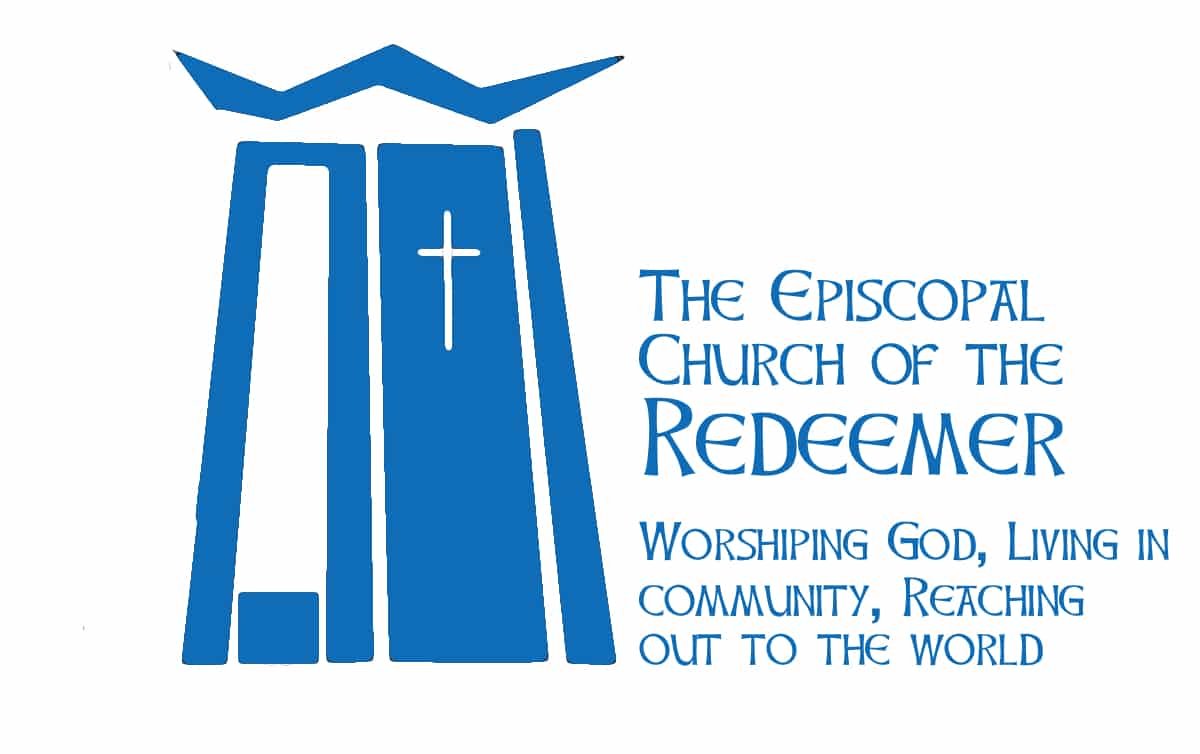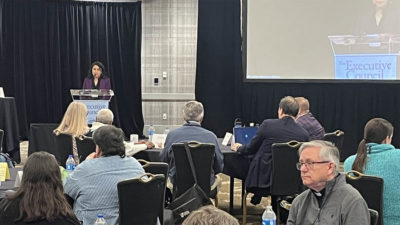[Episcopal News Service] More than two dozen Christian and Jewish organizations, including The Episcopal Church, sued the Trump administration on February 11, 2025, for allowing immigration officers to target churches and other “sensitive” places for arrests as part of the president’s promised crackdown on legal and illegal immigration.
The Episcopal Church and its fellow plaintiffs, represented by the nonpartisan Georgetown University Law Center, argue that by allowing arrests without first obtaining judicial warrants the Trump administration is violating First Amendment protections of both freedom of religion and freedom of association, because of the burden created by the “looming threat of immigration enforcement action at their places of worship and during their religious ceremonies.”
The lawsuit notes that many congregations serving immigrant communities have already seen decreases in worship attendance and participation in social service ministries. This decreased has happened since the Trump administration’s new policies took effect.
Seek to love our neighbors as ourselves
Presiding Bishop Sean Rowe, in a church news release about the lawsuit, echoed his recent sermon at Washington National Cathedral. He said that immigrants and refugees are not at the edges of God’s kingdom but at its center.
“We believe their struggles reveal the heart of God, and we cannot worship freely if some among us live in fear. We are seeking the ability to fully gather and follow Jesus’ command to love our neighbors as ourselves.”
The Most Rev. Sean Rowe, XXVIII Presiding Bishop of the Episcopal Church
The federal policy shift was enacted in the first days of the new administration. It has spread fear in many of the plaintiffs’ worshipping communities, the lawsuit says. It also runs counter to biblical teachings that “every human being, regardless of birthplace, is a child of God worthy of dignity, care and love.”
President Donald Trump vowed during his campaign to oversee mass deportations of millions of people living in the United States without permanent legal residency status. He began pursuing policies to follow through on that promise in the hours after his January 20, 2025, inauguration to a second term. This was done with a series of executive orders related to immigration.
Episcopal congregations affected
The lawsuit filed by the 27 faith-based organizations does not take direct issue with those orders. The lawsuit take issue with separate directives issued by the Trump administration’s Department of Homeland Security. On January 21, the department ended Biden administration policies that had identified certain sensitive areas as protected from immigration enforcement actions. Those areas included schools, hospitals and houses of worship,
The church’s release says some Episcopal congregations in the United States are among the houses of worship where even some immigrants with legal residency have chosen to stay home rather than attend worship services because of the risk of arrest.
“Welcoming the stranger is not a political act. It’s a sacred obligation,” House of Deputies President Julia Ayala Harris said in the news release. “When immigrants walk through our church doors, they’re not entering as outsiders; they are stepping into the heart of our faith, where their dignity and stories are embraced as reflections of God’s love. This lawsuit is about protecting our ability to live out the Gospel without fear or interference.”
The plaintiffs’ 80-page complaint includes short summaries of ways the government’s policies have burdened the faith organizations’ practice of their religions. The Episcopal Church’s summary includes the following examples, which do not give specific locations or congregation names:
- Local officials parked outside one Episcopal church during past enforcement efforts and attempted to arrest undocumented congregants leaving the church.
- At another congregation, federal agents already have appeared outside its food pantry, photographing those in line.
- In one Episcopal diocese, some congregants were reluctant to join an informational Zoom call with an immigration attorney.
- Some congregations have stationed members at their doors to watch for immigration officials.
Other religious groups affected
The Episcopal Church is one of 12 denomination bodies that have signed onto the lawsuit. Signers include the Disciples of Christ, Mennonite, Methodist, Presbyterian, and AME Zion churches. Other plaintiffs include regional denominational bodies and other religious associations
“We declare our unequivocal opposition to any and all attempts by the government or any other external entity to infringe upon or restrict or otherwise interfere with the free exercise of religion by members of our congregations,” the Rev. Carlos Malave, president of Latino Christian National Network, said in a Zoom news conference about the lawsuit.
Rabbi Rick Jacobs spoke on behalf of the Union for Reform Judaism, the largest Jewish denomination in the United States.
“The opening of the Hebrew Bible tells us that every single human being is created in God’s image and there are simply no exceptions,” Jacobs said.
And Rowe, in his remarks during the news conference, affirmed The Episcopal Church’s support for the lawsuit, which he said contained a “compelling and conservative argument about the exercise of religion.”
“We cannot worship freely if some among us live in fear. We must proclaim, particularly in this time, that all are welcome in our places of worship and should be able to be in those places worshipping their faith of choice without fear. This seems a basic human right, but certainly one we’re called to by the God that we serve.”
Presiding Bishop Sean Rowe
The lawsuit says many of the member churches and synagogues have undocumented congregants, as well as ministries that serve undocumented people. These ministries include food and clothes pantries, English classes, legal assistance, and job training services.
Recent enforcement action at a Florida church
“An immigration enforcement action during worship services, ministry work or other congregational activities would be devastating to their religious practice,” the lawsuit says. “It would shatter the consecrated space of sanctuary, thwart communal worship and undermine the social service outreach that is central to religious expression and spiritual practice for plaintiffs’ congregations and members.”
The lawsuit, filed in the U.S. District Court for Washington, D.C. It seeks an injunction against the federal government that would block immigration enforcement at houses of worship or during worship services unless authorities first obtain judicial warrants.
The lawsuit cites at least one reported case in which immigration agents attempted an arrest at a church. Wilson Velásquez, is a migrant from Honduras who came to the United States and applied for asylum in 2022. He was with his family attending a Pentecostal service in Atlanta, Georgia. The pastor reportedly was in the middle of his sermon when Immigration and Customs Enforcement agents arrived at the church to arrest Velásquez.
The pastor tried to reassure the congregation, according to the lawsuit. However, he “could see the fear and tears on their faces.”
The plaintiffs, their congregations and their members “face an imminent risk of similar immigration enforcement actions at their places of worship,” the lawsuit says.
Lawrence Hitt II, chair of The Episcopal Church Executive Council’s Governance and Operations Committee, provides oversight of the church’s legal affairs. He said in a written statement for this story that prevailing in the lawsuit was “vitally important” to the church and its ministries.
“The filing of this lawsuit demonstrates the commitment of The Episcopal Church to migrants and others as we strive to follow the Gospel imperative set forth in Matthew when Christ said ‘I was a stranger and you welcomed me,’” Hitt said.
Other Trump administration policy changes
The Trump administration’s new restrictions on immigration also effectively halted the United States’ 45-year-old program of refugee resettlement. Ten agencies with federal contracts facilitated that work, including Episcopal Migration Ministries.
On February 11, 2025, some of the 10 refugee resettlement agencies sued the Trump administration to reverse his order suspending the program. The Episcopal Church is not a party to that lawsuit.
David Paulsen is a senior reporter and editor for Episcopal News Service based in Wisconsin. He can be reached at dpaulsen@episcopalchurch.org.
About Episcopal News Service
Episcopal News Service (ENS) offers in-depth reporting of local, regional, national and international news for Episcopalians and others interested in the church’s mission and ministry. Episcopal News Service is the official news source of the Episcopal Church.

Church of the Redeemer
Church of the Redeemer: Worshiping God, living in community, and reaching out to the world around us. We are an Episcopal Church serving north King County and south Snohomish County, Washington. As you travel your road, go with friends walking the way of Jesus at Redeemer.
Church of the Redeemer is at 6210 Northeast 181st Street in Kenmore, Washington. The campus is a short distance north of Bothell Way, near the Burke-Gilman Trail. The entrance looks like a gravel driveway. The campus is larger on the inside than it is on the outside. And we managed to hide a large building on the side of a hill that is not easily seen from the street.
The Episcopal Church welcomes you.






